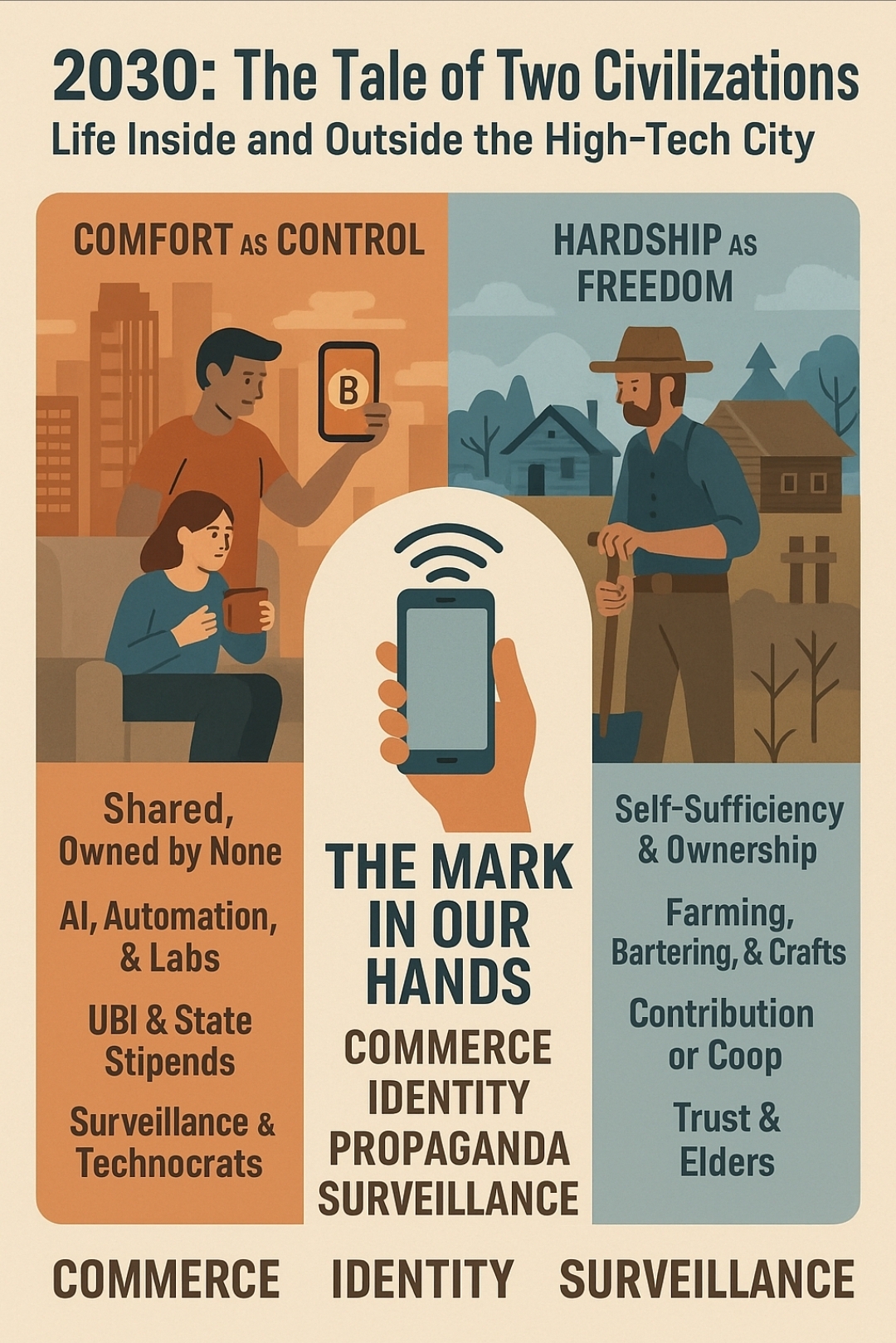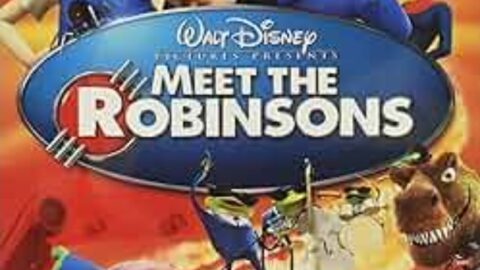Introduction: The Fork in the Road
The World Economic Forum’s 2030 scenario — “I own nothing, have no privacy, and life has never been better” — paints a glossy picture of hyper-connected urban life. Everything is rented, shared, and streamed: homes, cars, meals, even clothes. But tucked inside the narrative is a haunting line:
“They live different kinds of lives outside of the city.”
This single phrase exposes the great divide. One half of humanity embraces the high-tech city, with comfort as its creed. The other half rejects it, forming off-grid enclaves where survival means returning to a 19th-century rhythm.
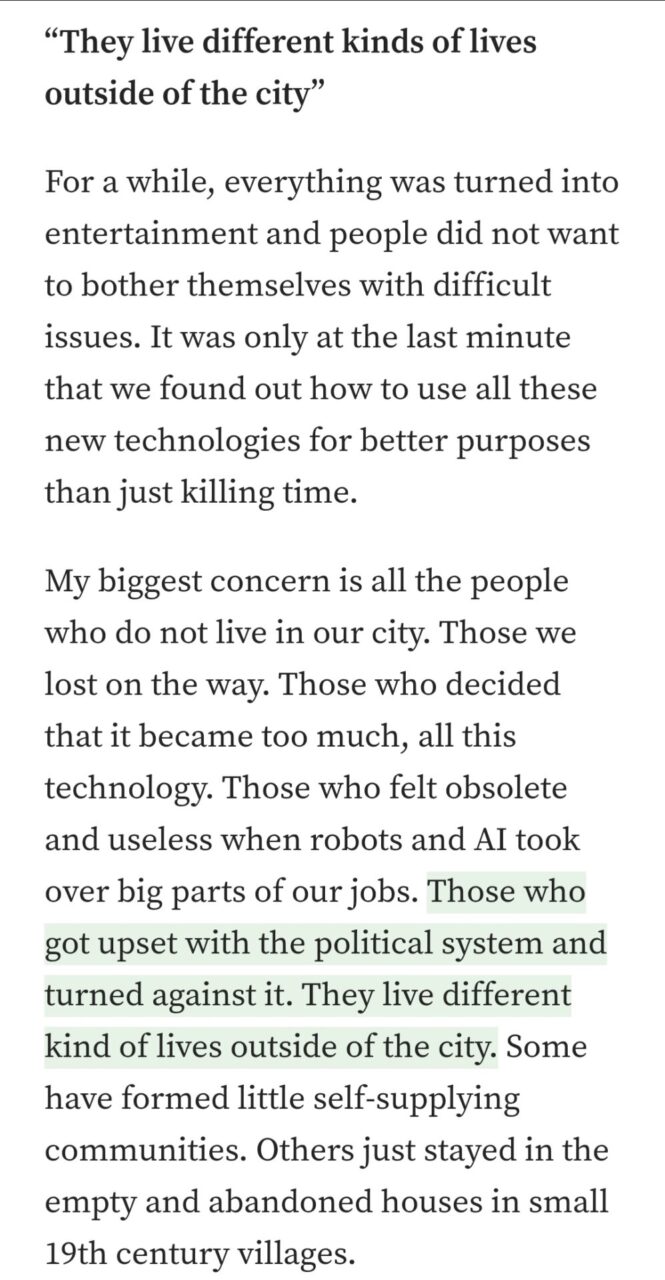
The result: two parallel civilizations.
The High-Tech City: Comfort as Control — Rewired
In this vision of the future, control doesn’t come through chains, but through comfort. It’s the carrot, not the stick. Convenience, AI-driven services, automation, and seamless consumption replace autonomy, ownership, and freedom. People don’t rebel because they’ve been rewired—psychologically, neurologically, and emotionally—to crave the system that cages them.
Dr. Joe Dispenza’s Rewired reminds us that the brain and body can be trained by repetition, emotion, and environment until people no longer need external force to comply. They become addicted to their own cage.
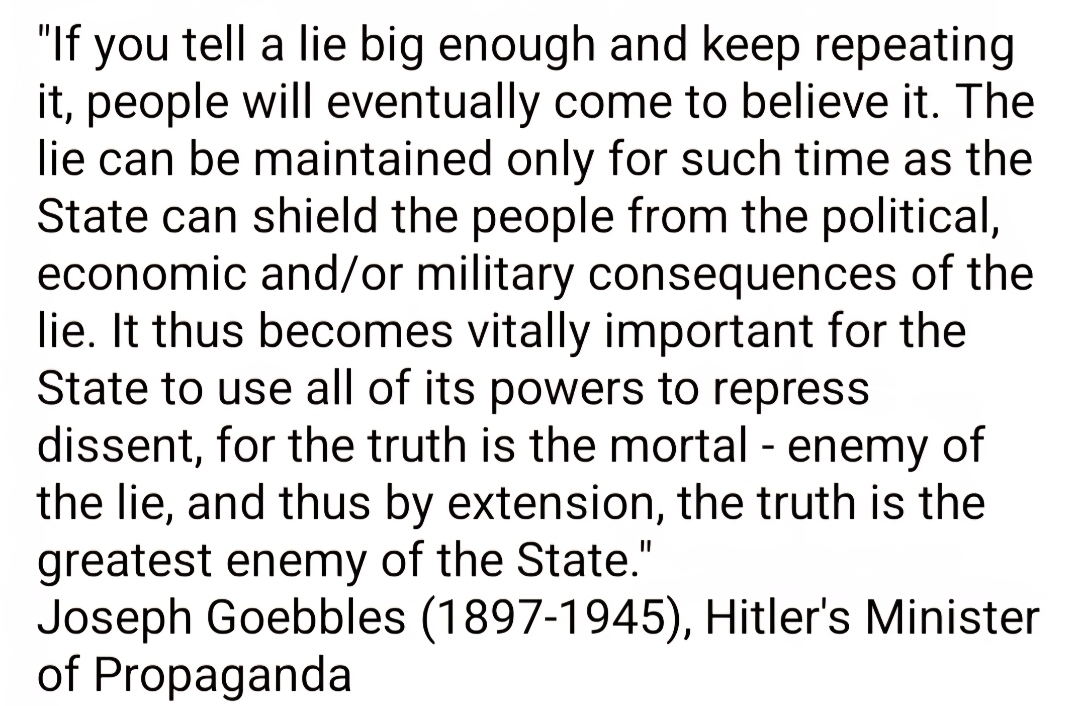
Food
- Delivered on demand by drones or shared kitchens.
- Lab-grown meat and synthetic substitutes dominate.
- Kitchens disappear—cooking is no longer a skill but a nostalgic hobby.
- Rewired angle: Every time you push the button and food arrives in 10 minutes, your brain wires deeper into dependence. Dopamine rewards shrink patience, resilience, and self-sufficiency.
Work
- Automation eliminates most labor; design, entertainment, and “emotional labor” remain.
- Many live on Universal Basic Income (UBI), pacified with digital credits.
- The economy monetizes attention, habits, and emotions.
- Rewired angle: Instead of achievement shaping identity, people wire their sense of worth to likes, follows, and digital status. Effort fades, replaced by constant emotional feedback loops that keep the nervous system addicted.
Housing & Living
- No private property: homes are “borrowed” or reassigned weekly.
- Furniture, clothes, even kitchens become subscription based.
- Rewired angle: Each time someone adapts to disposability (“this isn’t mine, I’ll have a new one tomorrow”), their brain wires for detachment. Permanence feels strange; transience feels normal. People forget how to fight for ownership because their neurons now equate impermanence with safety.
Education
- AI-driven, fully digitized learning.
- Curriculum emphasizes STEM, compliance, and “digital citizenship.”
- History rewritten to match corporate/state narratives.
- Rewired angle: Repetition shapes belief. By training children daily to trust the system’s story, their subconscious wires conformity. Questioning feels like danger, while obedience feels like survival.
Governance
- Surveillance woven into every object: sensors, cameras, data trails.
- “Freedom” redefined as frictionless convenience.
- Political decisions outsourced to AI and technocrats.
- Rewired angle: Over time, people emotionally pair the feeling of safety with being watched. The nervous system calms when cameras are present. Privacy feels uncomfortable. The brain rewires so that the cage feels like comfort.
The Pillow Cage
Daily life here is seamless, soft, and efficient. The cage is padded with pillows: drones deliver dinner, UBI credits arrive like clockwork, entertainment never ends, and risk is nearly eliminated.
But the trade is immense:
- Privacy is gone.
- Ownership is erased.
- Autonomy is forgotten.
The tragedy is that people don’t even feel enslaved. Their brains have been rewired to associate the cage with comfort, safety, and normalcy. The shackles are neurological, not metallic.
Key Takeaway
The High-Tech City shows the ultimate fusion of technology and psychology: control without visible force. As Dr. Joe Dispenza warns, the brain can be conditioned to expect and crave its prison.
The only way out is to rewire ourselves consciously—to step off the dopamine loop, reclaim resilience, and remember that true freedom means friction, ownership, and responsibility.
The Off-Grid Villages: Hardship as Freedom — Rewired
While the High-Tech City offers comfort as control, the Off-Grid Villages embrace hardship as the price of freedom. Here, life is slower, rougher, and more uncertain, but also more authentic. Survival depends on personal responsibility, shared labor, and moral trust.
Dr. Joe Dispenza’s Rewired reminds us that the human brain and nervous system adapt to whatever environment they are immersed in. Stress can enslave or liberate depending on whether it’s artificial (propaganda-driven fear) or natural (the strain of planting, building, working, surviving). In off-grid life, discomfort doesn’t weaken people — it strengthens and rewires them for resilience.
Food
- Locally grown gardens, small farms, livestock.
- Preservation: canning, smoking, fermenting.
- Communal meals — slower, harder, but deeply connected.
Rewired angle: Preparing food by hand reconditions patience and discipline. The brain wires itself away from instant gratification and back into rhythms of nature. Gratitude, not dopamine, becomes the reward.
Work
- Manual labor: farming, carpentry, blacksmithing, trades.
- Barter economy: direct exchange of skills and goods.
- No UBI safety net — survival depends on contribution.
Rewired angle: Physical effort reconnects the mind-body loop. Each harvest, each repaired roof rewires the nervous system for agency and purpose. The reward is not a paycheck, but competence and self-mastery.
Housing & Living
- Families reclaim abandoned homes; repair with wood, stone, hand tools.
- Heat from wood stoves, water from wells, light from solar.
- Simple living, but true ownership and control.
Rewired angle: Ownership rewires the brain with permanence. Unlike city dwellers, who adapt to disposability, villagers adapt to stewardship. They literally shape and reshape their environment — and their minds adapt by valuing stability and responsibility.
Education
- Elders and parents teach skills and morality.
- Books, oral traditions, and direct apprenticeship replace screens.
- Focus on craftsmanship, self-reliance, and conscience.
Rewired angle: Storytelling and practice wire deep identity into children. Instead of endless digital novelty, repeated physical skills and moral lessons shape subconscious belief: “I am capable. I am responsible. I belong to this people.”
Governance
- Councils or elders guide the community.
- Reputation, honor, and trust matter more than bureaucracy.
- Suspicion of distant powers — survival has taught vigilance.
Rewired angle: Instead of being conditioned to trust surveillance, villagers wire their nervous systems to trust relationships. Safety comes from trust earned over time, not cameras in every corner.
Hardship as Neurological Freedom
Dispenza teaches that neurons that fire together wire together. In the Off-Grid Villages, hardship fires resilience. Every time a person faces hunger, cold, or labor and survives, their brain wires confidence and endurance.
By contrast, the High-Tech City wires helplessness: push a button, get a reward. The Off-Grid Villages wire sovereignty: sweat today, eat tomorrow.
The Contrast
- City dwellers become comfortable, safe — but dependent, rewired to love the cage.
- Village dwellers become uncomfortable, strained — but free, rewired to handle chaos without surrendering autonomy.
Takeaway:
The Off-Grid Villages show that hardship can be sacred. When embraced willingly, it rewires people to resist manipulation, endure difficulty, and live authentically. The cage of pillows pacifies, but the fires of labor purify.
Two Definitions of Freedom
This split isn’t just about lifestyle. It’s about philosophy:
- City dwellers see villagers as backward, poor, or even dangerous. They define freedom as freedom from struggle.
- Villagers see city folk as enslaved by comfort, surveillance, and dependency. They define freedom as freedom from control.
Both claim to live free — but their freedoms are incompatible.
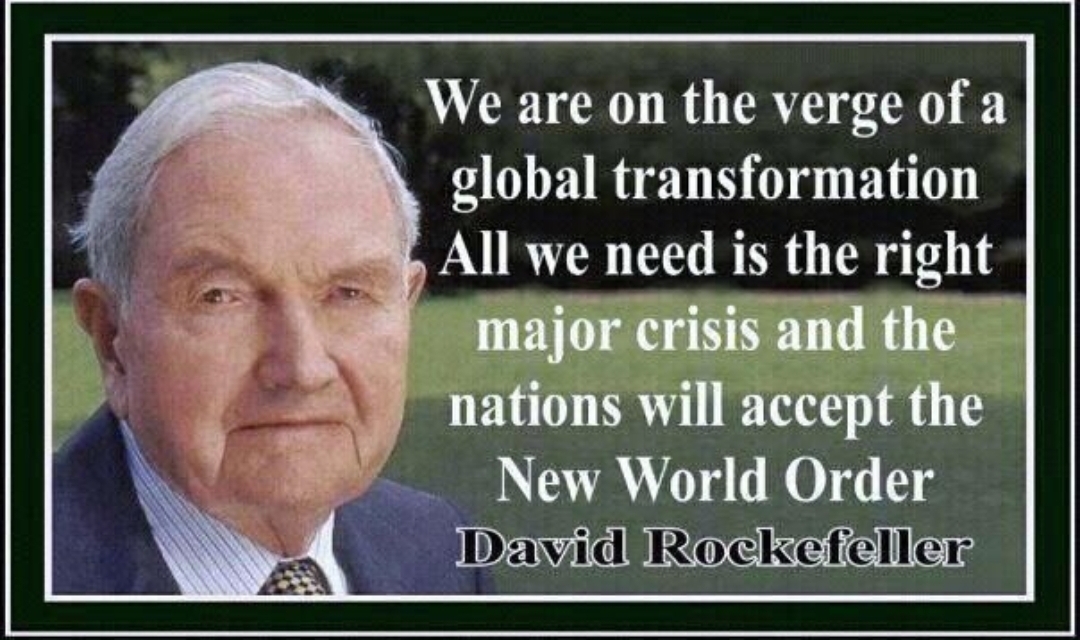
Why Leaving the High-Tech City Won’t Be Easy
The City’s Pull of Comfort
- Most people naturally choose ease over effort.
- The City offers safety nets: food delivered, healthcare guaranteed, no ownership burdens.
- Many won’t even realize they’ve given up freedom because convenience feels like freedom.
Rewired insight: The brain wires itself to seek the familiar. Comfort conditions the nervous system to avoid effort. Neural pathways of dependency grow stronger with every swipe, every automated delivery, every “seamless” transaction. People literally become addicted to ease.
The Village’s Barrier of Hardship
- Going off-grid demands sacrifice: physical labor, discomfort, uncertainty.
- Few have the skills to farm, build, or survive without the system.
- It’s not just a choice of philosophy, but of capability.
Rewired insight: Hardship creates new neural wiring. Planting, repairing, cooking from scratch—all reprogram the brain for resilience. But this rewiring requires sustained discomfort. Many collapse before their brains and bodies adapt, because their nervous systems are calibrated for comfort, not struggle.
Economic Chains
- Dependency on UBI/stipends: once basic income replaces wages, refusing it means losing access to the only “currency” available.
- Digital Money: with central bank digital currencies (CBDCs), living outside the system means no way to buy or sell beyond barter.
- Land Ownership Restrictions: off-grid living requires land, but laws, taxes, or zoning can make that nearly impossible.
Rewired insight: Economic dependence is neurological dependence. Accepting a stipend becomes a habit loop—dopamine spikes on payday, even when it’s state-controlled. Over time, people stop imagining alternatives because their brains are wired to equate survival with compliance.
Legal & Institutional Pressure
- Permits & Codes: even collecting rainwater or building a cabin could be restricted.
- Healthcare Gatekeeping: hospitals and medications may be tied to digital IDs.
- Surveillance & Enforcement: outsiders may be branded as radicals or denied legal protections.
Rewired insight: Fear-based systems create stress chemistry (cortisol, adrenaline) that keeps people in survival mode. Chronic fear narrows attention, makes people impulsive, and wires compliance. Only those who regulate their nervous system—breaking out of survival chemistry—can think clearly enough to resist.
Social & Cultural Pressure
- Stigma: off-gridders cast as selfish, dangerous, or backward.
- Family Division: some members stay, others leave, fracturing households.
- Isolation: villages cut off from larger society.
Rewired insight: The human brain is wired for belonging. Rejection by the “tribe” triggers pain as real as physical harm. Most people will cling to propaganda rather than endure that social pain. Only those who consciously rewire their identity—choosing truth over approval—can break free.
Psychological Obstacles
- Fear of Hardship: modern people lack survival skills.
- Comfort Addiction: entertainment and ease numb the will to resist.
- Identity Shift: leaving the system means being branded “obsolete” or “primitive.”
Rewired insight: Addiction to comfort is neurochemical. Dopamine from Netflix, fast food, or social media wires the brain to crave the next “hit.” Breaking free requires detoxing not just physically, but mentally—rewiring reward pathways to value effort, patience, and meaning over quick pleasures.
Generational Divide
- Children raised in tech resist boredom and labor.
- Elders with memory recall independence and push for it.
- Families split by worldview, not just preference.
Rewired insight: Children’s brains adapt to whatever environment they grow up in. Tech-trained children are wired for stimulation, speed, and reward. Elders remember slower, harder rhythms. Bridging the divide requires teaching younger generations how to rewire their nervous systems for patience, focus, and endurance.
The Core Dilemma
Choosing the Village isn’t just about freedom vs. comfort. It’s about giving up legal and economic safety nets, bearing stigma, and facing genuine hardship.
Rewired insight: The High-Tech City wires dependence; the Off-Grid Village wires resilience. The choice is not only external but neurological. Leaving the City requires literally retraining the brain—shifting from addiction to comfort toward strength in hardship.
The choice feels less like selecting a lifestyle and more like choosing exile from an empire. But in that exile lies the possibility of rewiring humanity itself—one community, one mind at a time.
The Tear in Truth
As crises unfold, this split doesn’t remain a simple lifestyle choice — it becomes a battle over truth itself. Each disruption, whether economic, political, or environmental, drives people deeper into the high-tech system with promises of safety and stability. Propaganda fills the gap where clarity should be, soothing fears with comforting narratives while demonizing those who refuse compliance.
This creates what can only be called a tear in truth: a widening gulf where more and more people choose the security of illusions over the discomfort of reality. At that moment, the divide between the two civilizations is no longer just material — it becomes philosophical, even spiritual. One side lives in managed illusions; the other clings to raw, unmediated life.
Rewired insight: Dr. Joe Dispenza explains that the brain wires itself around repeated emotions, thoughts, and habits. Each time people choose the comfort of propaganda, their nervous systems become conditioned to accept fear-based authority as safety. They literally wire dependency into their brains. Conversely, those who resist — who face the discomfort of being marginalized or mocked — begin to rewire themselves for resilience and clarity.
The tear in truth, then, is not just cultural — it is neurological. Entire populations are training their brains to either:
- Seek safety in illusion (dopamine-driven cycles of convenience, comfort, and compliance), or
- Seek strength in reality (rewiring the nervous system to tolerate uncertainty, hardship, and freedom).
This is why the divide feels unbridgeable: it’s not just a matter of opinion. It’s two populations whose brains are being rewired in opposite directions.
Closing: The Mark in Our Hands
The fork between the high-tech city and the off-grid village is not only political or cultural — it reaches into prophecy itself. Revelation warns of a system where no one can buy or sell without the mark of the beast. For the first time in history, we now hold in our hands a device that makes this possible. The smartphone has become the vehicle of the mark: the medium through which identity, commerce, information, and surveillance are all merged. It is not imposed with chains but embraced through convenience.
This is what makes the choice so difficult. To give up the system is not only to give up comfort, but also the phone that ties us to our work, our families, our finances, and our very sense of belonging. Most will not be willing to part with it. They will trade freedom for ease, truth for illusion, and in doing so, bind themselves to the very system of control Scripture warned us about.
Rewired insight: Dr. Joe Dispenza shows that the brain and body become addicted to familiar habits and emotions. Every notification, every swipe, every dopamine hit from our phones literally conditions the nervous system to crave the device. The smartphone doesn’t just sit in our hands — it wires itself into our brains. What Revelation foresaw as “the mark in the hand” is now reinforced by biology: the more we use it, the harder it is to let go.
That is why this struggle is not simply external — it is internal, neurological, and spiritual. The device becomes both the leash and the comfort blanket, a symbol of belonging and a tool of control. To resist it requires more than willpower; it demands rewiring our minds toward freedom, courage, and conscience.
In the end, the mark is not just technology — it is the fusion of convenience, conformity, and conditioning. And the remnant will be those who choose the harder path: to rewire their lives and hearts away from illusion, even if it costs them everything.
The two civilizations are already forming: one inside the cage of convenience, carrying the mark in their hands; the other outside, clinging to hardship but also to freedom. The question is no longer abstract. It is here, it is present, and it is personal: Will we choose the security of the beast, or the costly freedom of God?

